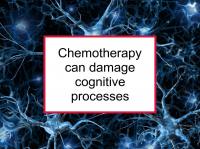Chemotherapy drugs can produce cognitive deficits collectively known as chemo brain or chemobrain. Chemo brain was formerly regarded primarily as a psychological phenomenon associated with the stress linked to breast cancer. Studies that established clear before and after changes in cognitive functioning altered this perception.
These were followed by brain imaging and animal studies that demonstrated clear physical damage in the brain as a result of chemotherapy, including measurable reductions in brain gray matter. Now it is clear that chemotherapy does in fact cross into the brain, at least in order to cause damage.
What is chemo brain?
As noted above, chemo brain results from brain damage, much of which heals over time, but some of which appears to persist for decades. Chemotherapy appears to produce cognitive impairment in part by disrupting the formation of new nerve cells (neurogenesis) in the brain. However, chemo brain does not appear to set the stage for Alzheimer's disease in old age.
Chemo brain is characterized by reduced verbal ability, faulty short-term memory and other deficits. This translates into symptoms such as frequent memory lapses, trouble focusing and multitasking, slowed thinking and decision making, and difficulty remembering common words or names. There are unwelcome glitches in the brain's operations. Unconscious mistakes can occur in tasks that are simple and routine. For example, typing and spelling errors might become common. Chemo brain can feel like moving through a fog, where the outlines of thoughts are indistinct. Productive thinking itself can become more difficult, so that it takes effort to complete a thought or come to a conclusion. Now a new study has reported that chemotherapy can result in impaired decision making.
Latest research finds chemotherapy can harm decision-making
The study referenced at the beginning of this news article was designed to investigate the cognitive impairment caused by chemotherapy for breast cancer by assessing decision-making under ambiguity and risk. The study included 63 breast cancer patients who had undergone chemotherapy, 62 patients who had not, and 61 matched cancer-free controls. The authors tested all three groups of participants using the Iowa Gambling Task (to evaluate decision-making under ambiguity), the Game of Dice Task (to assess decision-making under risk), and various neuropsychological tests.
Women who had undergone chemotherapy were found to make poor decisions with a higher frequency than non-treated patients or healthy women during the Iowa Gambling Task test. The chemotherapy group also had worse scores in attention, memory, executive functions and cognitive processing when compared with the other two groups. Executive functioning refers to the ability to organize thoughts and prioritize tasks, manage time well, make plans, and adapt to changing situations. Cognitive processing refers to the ability to automatically and fluently perform relatively easy or routine cognitive tasks, especially when attention and focused concentration is required.
The authors also found significant correlations between the Iowa Gambling Task performance and information processing and working memory within the chemotherapy group. On the other hand, all three groups performed at the same level in the Game of Dice Task. The authors conclude that breast cancer survivors treated with chemotherapy may have selective reductions in Iowa Gambling Task performance but not in Game of Dice Task performance. This implies dysfunctions in the limbic loop rather than in the dorsolateral prefrontal loop, according to the authors.
Please see our article on chemo brain for more information.
